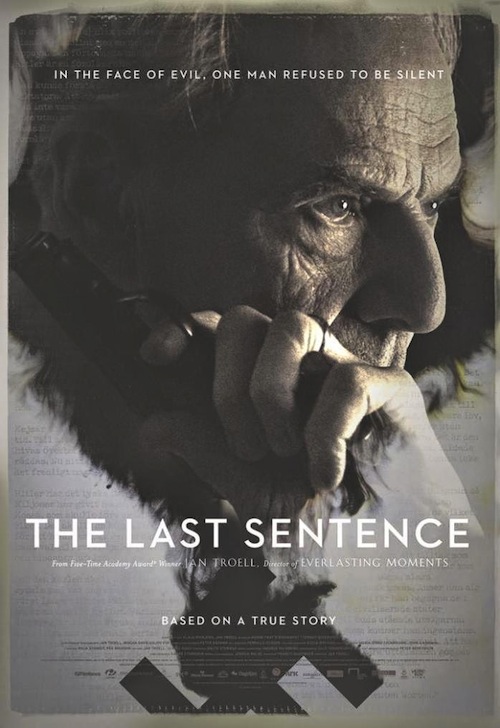By Joe Bendel. Torgny Segerstedt is considered the paragon of Swedish leftist journalists, but he had no love for the Soviets. In 1924, the future critic of German National Socialist marked the death of Lenin with an editorial castigating the deceased dictator as a “curse” upon the Russian people, amongst other things. Of course, the National Socialist and Communists were allies for good portion of his career. Like a lone voice in the wilderness, Segerstedt inveighs against Hitler and Swedish “neutrality” in Jan Troell’s biographical drama, The Last Sentence, which opens this Friday in New York.
Segerstedt was a difficult person, as his publisher Axel Forssman (the original “Axel F”) could well attest. Despite their friendship and close professional ties, Segerstedt was rather openly carrying on an affair with his wife Maja, a Jewish heiress who shared Segerstedt’s editorial convictions even before the rise of Hitler. Segerstedt’s emotionally damaged wife Puste is also fully aware of his long term infidelity, but she is powerless to stop it.
 When Hitler consolidates power, Segerstedt welcomes him to the world stage with an editorial so blistering it draws a protest from the German foreign ministry. Not surprisingly, this only encourages crusading editor, but thoroughly panics the new Swedish government. Soon, Segerstedt is contending with state censorship and taking meetings with the king and prime minister, who are not amused. Yet, he remains maddeningly aloof from friends and family, even including Maja Forssman. Frankly, Troell and co-screenwriter suggest his only real love was reserved for his three dogs (two black hounds and a bulldog), which would be an odd similarity between him and his favorite target for scorn.
When Hitler consolidates power, Segerstedt welcomes him to the world stage with an editorial so blistering it draws a protest from the German foreign ministry. Not surprisingly, this only encourages crusading editor, but thoroughly panics the new Swedish government. Soon, Segerstedt is contending with state censorship and taking meetings with the king and prime minister, who are not amused. Yet, he remains maddeningly aloof from friends and family, even including Maja Forssman. Frankly, Troell and co-screenwriter suggest his only real love was reserved for his three dogs (two black hounds and a bulldog), which would be an odd similarity between him and his favorite target for scorn.
Troell clearly tries to remind viewers the principled dissenters of the world are often self-absorbed jerk-heels, because they do not care what people think. There is no question Segerstedt advocated for just causes, including Swedish military intervention on behalf of Finland against the Soviets, but you would not want to be married to him.
Without question, Segerstedt lived a dramatic life, but there is still something unsatisfying about a film that chronicles the Winter War and WWII from the perspective of a drawing room in a neutral country. Danish Jesper Christensen plays the old Swedish newspaperman with perfect erudite severity, but viewers will often feel he is giving them a withering stare over his spectacles during an incredibly awkward editorial meeting.
In contrast, Björn Granath accentuates Axel F’s low key decency and personal pragmatism, making some sense out of his highly inequitable personal relationships. As Forssman and Puste, Pernilla August (a.k.a. Anakin’s mom, Shmi Skywalker) and Ulla Skoog are quite solid wrestling with their insecurities, but they look so much alike, his infidelity seems inexplicably reckless.
Troell and co-DP Mischa Gavrjusjov’s black-and-white cinematography is absolutely arresting, but the film in general is a cold, standoffish affair. It is a cerebral work that forthrightly asks where neutrality ends and collaboration by inaction begins, but it rarely engages on an emotional level. Mostly recommended for longtime admirers of Troell’s work (such as the finely crafted Everlasting Moments), The Last Sentence opens this Friday (6/20) in New York at the Lincoln Plaza Cinema.
LFM GRADE: B-
Posted on June 18th, 2014 at 9:45pm.